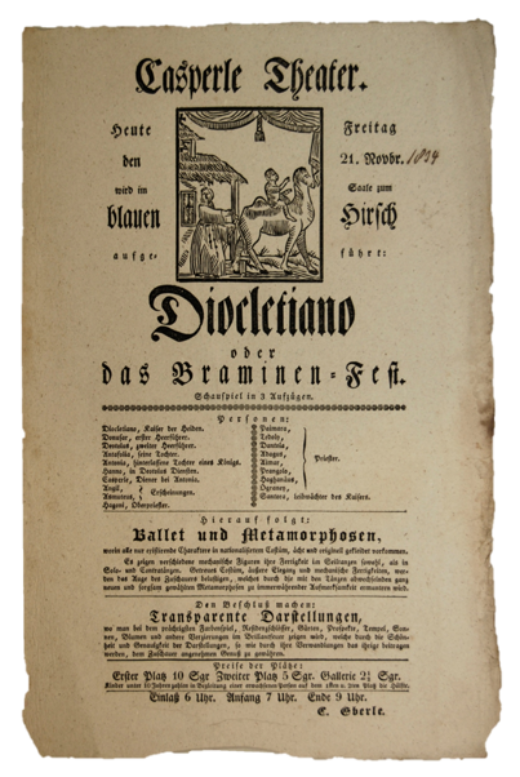
Printed
12 pages
Die Enthauptung der Heiligen Dorothea
The play probably originated in the 17th century. According to many different versions, it was performed by actors and puppeteers in the 18th century. Its success was such that, in the second half of the 18th century, it was considered a perfect example of a hackneyed play. Very few German theatres still played it at the beginning of the 19th century. The last attested performances were made by Josep Schütz (a puppeteer) and his son-in-law Carl (Georg?) Eberle’s company. Only Eberle’s handwritten version remains. He sold it to the Grand Duke of Saxe-Weimar-Eisenach in 1839, and the latter added it to his private library. Today, the manuscript is kept in Weimar (Klassik Stiftung Weimar, Goethe- und Schiller-Archiv, GSA 97/Vst 111). It was published for the first time by Christian Neuhuber in 2014.
A Christian woman converts many pagans and endures martyrdom for her faith
In Cassara, the Roman emperor Diocletiano wishes to kill all Christians. However, a Christian woman – Dorothea – lives in his court, and her father was promised protection by the emperor. The emperor’s most prominent warlords are Duosar and Theophil. Duosar is in love with Dorothea, while Theophil wishes to execute her for being a Christian. The ambitious Theophil feels looked down on by the emperor, who he thinks prefers Duosar, and he looks for a way to get rid of his young rival. When Hano the Moor tells him about Duosar’s scheme, Theopil believes that he is close to achieving his goal. Duosar means to save Dorothea and to join the Christian army. But the emperor does not want to let his favourite major go, and he considers another solution: if Theophil’s daughter, Antafolia, could convert Dorothea, the emperor would marry Antafolia, and Duosar would marry Dorothea. But after talking with Dorothea, Antafolia knocks down the statue of Jupiter, converts to Christianity and is killed by her own father. Duosar obtains Dorothea’s pardon from the emperor, but he is too late to prevent her execution. He then stabs himself to death. When it turns out that the Moor is the devil, Theophil calls for help and is rescued by a heavenly apparition. He is unstrung and converts. The high priest follows his example and adopts the Christian faith too, so do all the priests. Only the emperor still believes in his gods and begs them to send him a sign. When the execution room collapses, Diocletiano is disillusioned and kills himself using his own sword.
Other titles
First performance
Publications and translations
Neuhuber, Christian: Ein Gottesgeschenk für die Bühne. Dramatisierungen der Dorothea-Legende im deutschen Sprachraum. In: Havlíčková, Margita; Neuhuber, Christian (ed.): Johann Georg Gettner und das barocke Theater zwischen Nikolsburg und Krumau, Brno: Masarykova Univerzita, 2014, p. 169-181